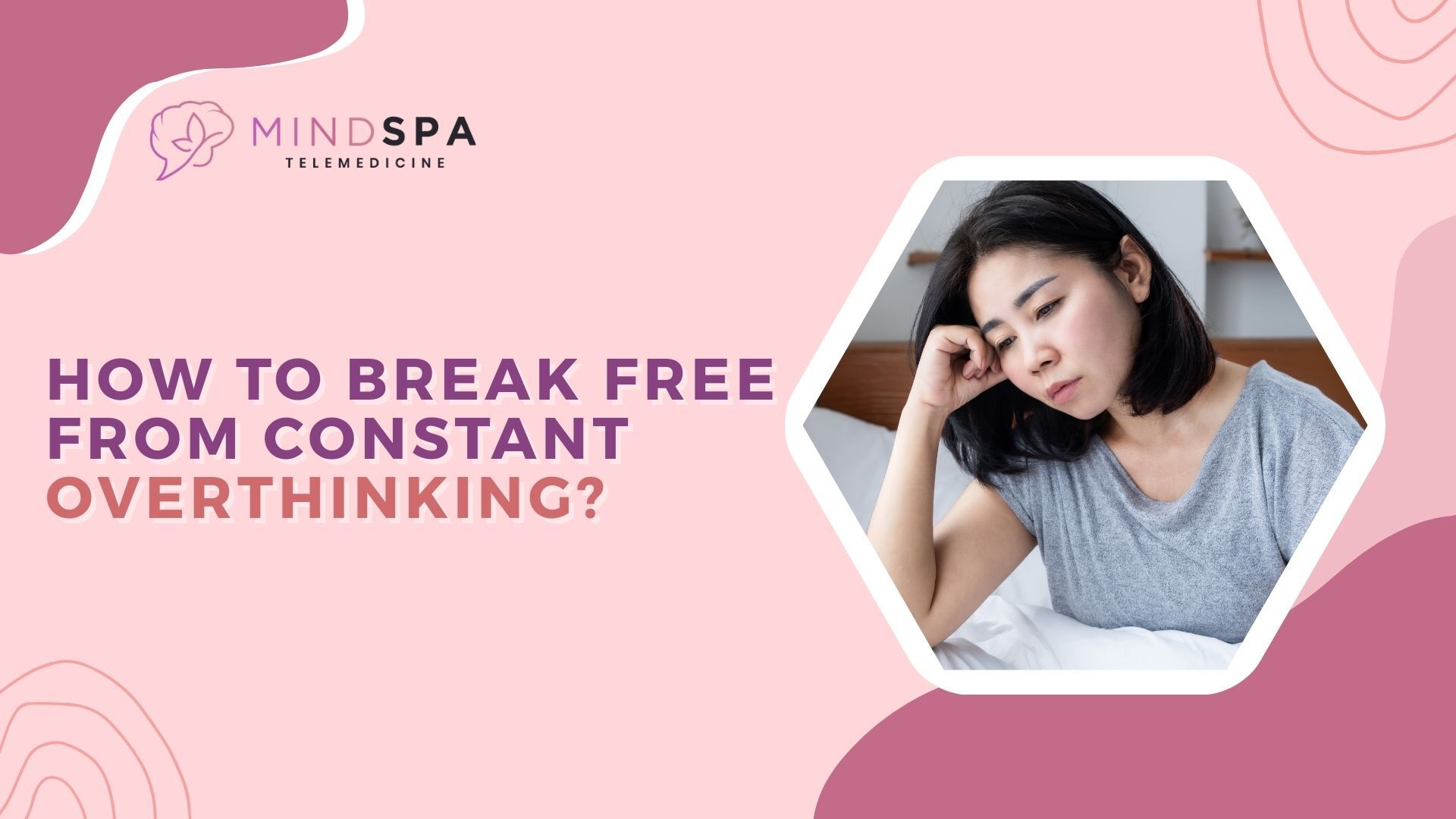Your brain maintains a repetitive cycle which appears impossible to break free from when overthinking occurs. You replay conversations. You imagine worst-case scenarios. You look at all situations until exhaustion sets in mentally. It’s exhausting—and worse, it’s isolating.
You are among many who experience such mental behavior. At MindSpa Telemed, we work with individuals just like you who are trapped in this mental cycle. Overthinking operates as more than an ordinary habit because your mind employs it as a result of feeling too anxious or uncertain or when it becomes overwhelmed.
Let’s break that cycle.
Why Do We Overthink?
The primary causes of overthinking usually consist of anxiety alongside self-doubt in addition to traumatic experiences and fear of errors. Without clarity and emotional safety, the brain maintains thought processing because it attempts to find solutions to nonexistent problems.
You might overthink because:
- You’re afraid of being wrong.
- You fear rejection or judgment.
- Past emotional situations have resulted in feelings of hurt as well as uncertainty for you.
Thinking more tends to worsen the situation. Once you enter this state, you lose both mental focus and sleep, as well as emotional peace. As time passes, your mind begins to deteriorate.

Signs You’re Stuck in a Loop
Not sure if what you’re doing is overthinking? Here are some telltale signs:
- Constantly replaying past conversations or events
- Struggling to make simple decisions
- You care excessively about situations or events that have not yet occurred
- Your mental processing works through constructing illogical mental scenarios along with imaginary arguments.
- Your mental exhaustion builds up while your body remains unable to recover.
Your emotional struggle with overthinking produces physical indications such as headaches and muscle tension, along with exhaustion, which leads to sleep disturbances.
What Helps Break the Cycle?
Overthinking won’t go away on its own. It takes a combination of awareness, tools, and support to shift your mindset and restore your peace.
Here’s what’s been proven to help:
1. Start Noticing Your Thought Patterns
Awareness is the first step. Begin observing your thoughts without judgment. Write them down. See how often they revolve around “what if” or “I should have.”
Once you see the pattern, you can start to interrupt it.
2. Practice Grounding Techniques
When your mind is racing, your body often follows. Grounding techniques bring you back to the present. Try these:
- Deep breathing exercises
- Describing your environment out loud (What can I see? Hear? Feel?)
- Stretching or walking in nature
These methods pull you out of your head and into your body.

3. Reframe Negative Thoughts
Overthinkers often assume the worst. But what if you challenge those assumptions?
Instead of “I probably embarrassed myself,” try: “Maybe it wasn’t as bad as I thought.”
Therapists at MindSpa Telemed use Cognitive Behavioral Therapy (CBT) techniques to help clients reframe these thoughts effectively.
4. Give Your Thoughts a Time Limit
Set a timer. Allow yourself 10 minutes to think about the issue. Then stop. Once the timer ends, shift your focus. Over time, this trains your brain to avoid spiraling for hours.
5. Seek Professional Support
You don’t need to do this alone. Talking to a licensed therapist helps you unpack the deeper reasons behind your overthinking. You’ll learn coping strategies that are personalized, not generic advice.
At MindSpa, our therapists meet you where you are—virtually, confidentially, and without judgment.

When Overthinking Is More Than Just a Habit
Sometimes, overthinking is linked to underlying mental health issues like anxiety disorders or Obsessive-Compulsive Disorder (OCD). These conditions can create intrusive thoughts that feel uncontrollable.
While OCD isn’t “curable” in the traditional sense, it’s highly treatable. Therapy helps reduce the intensity and frequency of obsessive thinking, allowing you to regain control over your mind.
What You Can Do Right Now
Here are a few immediate actions you can take today to break the cycle of overthinking:
- Journal for five minutes each morning. Let your thoughts out without editing.
- Set boundaries with your thoughts. Don’t check emails or social media right before bed.
- Focus on what you can control, not what you can’t.
- Replace “What if?” with “What is?”
These might seem simple, but over time, they build emotional resilience.
Ready to Take the First Step?
Overthinking doesn’t mean you’re weak. It means your mind is working overtime to protect you—even if it’s hurting you in the process.
The good news? You can train your brain to think differently. And it starts with one step: asking for help.
Our therapists at MindSpa Telemed are ready to guide you with real solutions. Not quick fixes. Not judgment. Just honest support from licensed professionals who understand how exhausting it is to be stuck in your head all the time.
Book your consultation now and take the first step toward peace of mind.
Frequently Asked Questions
How do I stop constantly overthinking?
You stop by creating space between you and your thoughts. Practice mindfulness, write down your worries, and work with a therapist to identify deeper emotional triggers. Therapy helps rewire those thought patterns so you’re not stuck in the same loop every day.
How do you break the loop of overthinking?
The loop ends when you recognize it’s happening and interrupt it. Use grounding exercises, set time limits on rumination, and engage your body through movement or breathwork. Regular therapy can give you long-term tools to stop overthinking before it spirals.
Is there a cure for Overthinking?
There isn’t a one-time cure, but overthinking is absolutely manageable. With consistent mental health support, new thought habits, and coping tools, people can significantly reduce how often they overthink and how much it affects their lives.
Can OCD be cured?
OCD isn’t curable, but it is highly treatable. With Cognitive Behavioral Therapy, Exposure and Response Prevention (ERP), and sometimes medication, many people with OCD lead full, functional lives with much fewer symptoms.
How do I stop thinking repeatedly?
Start by identifying thought triggers and replacing them with healthy actions. Journaling, movement, and relaxation exercises help. Therapy can teach you how to redirect obsessive thoughts and reframe them so they no longer dominate your day.


